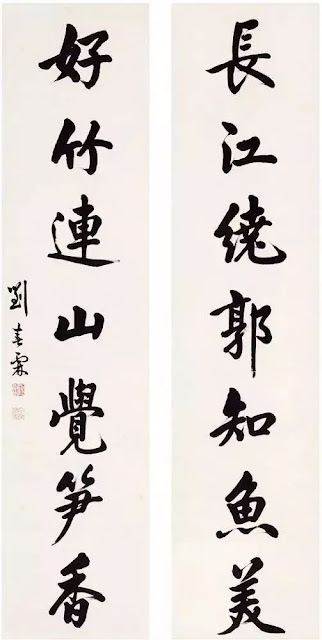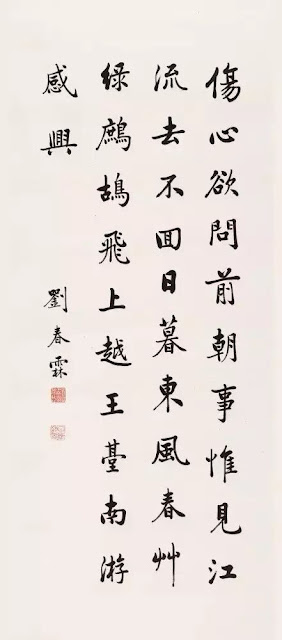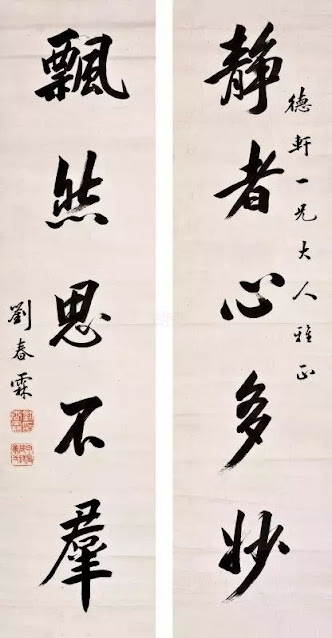The last "Zhuang Yuan" in Chinese history;
Having both ability and political integrity, in the face of the Japanese puppets, "Ning to be a beggar, not a traitor", keeps the evening festival and is admired by others.
His calligraphy is at its peak, as beautiful as a girl.
Liu Chunlin (1872-1944), the word Runqin, the name is Shiyun.
He was born in Suning County, Hejian Prefecture, Zhili Province in the late Qing Dynasty.
He was the number one scholar in the Jiachen Division in the 30th year of Guangxu (1904 AD) and the last number one in Chinese history.
He is good at calligraphy, especially in lower letters, and his brushwork is delicate and vigorous, which is highly respected by the world.
Liu Chunlin's family was poor, and he was a farmer for generations.
His father worked as a servant in Jinan and Baoding government offices, and his mother also worked as a maid in the prefect's house.
However, he was brilliant and hard-working, and he won the first prize in the 30th year of Guangxu (1904), becoming the last champion in Chinese history,
and he can be described as "the last of the first people." Speaking of his champion and first place, there is also an interesting story.

In July 1904, after the palace exam, the minister in charge of the examination was carefully selected, arranged the selected examination papers according to their ranks, and petitioned the Empress Dowager Cixi for "appointment."
The winner was Zhu Ruzhen. When the Empress Dowager Cixi saw the word "Zhen", she remembered the concubine Zhen who supported Emperor Guangxu's reforms.
Zhu Ruzhen was a Cantonese, which added fuel to Cixi's fire - Hong Xiuquan, Kang Youwei, Liang Qichao, Sun Yat-sen... These "first inversions" of the Qing Dynasty all came from Guangdong. So she threw Zhu Ruzhen's test paper aside.
The second test paper was written by Liu Chunlin from Suning, Zhili (now Hebei Province). The word "chunlin" means that the spring weather will transform the rain, and the rain will fall.
In addition, Zhili is located in Gyeonggi, and "Suning" symbolizes the peaceful scene of tranquility and tranquility. This is a natural sign of "auspiciousness" for the crumbling Qing dynasty.
As a result, the Empress Dowager Cixi made a big deal, making Liu Chunlin the top of the list, while Zhu Ruzhen had to fall behind.
Liu Chunlin held positions in both the late Qing Dynasty and the Republic of China. In the 9th and 10th years of the Republic of China, he represented President Xu Shichang twice to Qufu,
Shandong Province to preside over the ceremonies of Confucius Dacheng Festival, and he was famous for a while.
Liu Chunlin was very indignant when he witnessed the warlords' melee, internal fighting, and political corruption at that time. He likened his post in the presidential palace to a "chief officer." In 1928, he angrily resigned and retired to Peking.
Although Liu Chunlin lived in seclusion, he was quite concerned about the future of his country. After the "September 18th" Incident, the Japanese army occupied the three northeastern provinces, and Chiang Kai-shek ordered the northeastern army to retreat without a fight.
Liu was extremely indignant. This year, it was his 60th birthday. He was unwilling to make a birthday, saying: "The survival of the country is still uncertain, and the blessings are unpredictable.
What kind of birthday is there? If the skin does not exist, the hair will be attached?" On the birthday, a long poem of "Sixty Self-reports", which contains
This sentence: "Worrying about the country and being able to watch the color show, it has been a trillion years to pass on the snow."
In 1934, in the name of Manchukuo, Zheng Xiaoxu, the prime minister of the puppet government of Manchukuo, specially invited Liu Chunlin to take up the post of "Puppet Manchukuo Education Minister" in the name of Manchukuo, but he sternly refused.
After the "July 7" Incident broke out, the Japanese occupied Beiping. The traitor Wang Yitang (Wang and Liu are scholars of the same science) wanted to borrow Liu Zhuangyuan's famous work and invite him to be the mayor of Beijing, but was also rejected.
The Japanese puppet was so angry that they copied Liu Chunlin's home, looted his collection of paintings and calligraphy treasures over the years, and drove his family out of the house.
Liu Chunlin said angrily: "Ning is a beggar, not a traitor!" Later, under the strong pressure of public opinion, he was allowed to return home,
allowed him to redeem the painting and calligraphy with a large amount of money, and returned the property that he had taken away.
It is a pity that Liu Chunlin did not wait for the day of victory in the War of Resistance Against Japan. In 1944, he died at the age of 73. After Liu Chunlin's death, the ceremony was very solemn, and there was an endless stream of mourners.

But his most praised is calligraphy. As early as when Liu Chunlin was not in the throne, Weng Tonghe, a famous official in the late Qing Dynasty and two generations of emperors, was amazed when he saw his pen and ink, and predicted that he would be the world leader.
The plaque is the golden signboard of the shop, and most of the inscriptions are made by famous artists. Some Japanese merchants followed the example of time-honored brands and invited famous artists to write inscriptions to add luster to the shop.
There is a Japanese named Kato who opened a "Fuji Bicycle Shop" that sells bicycles made in Japan. Please ask Liu Chunlin to ask Write a plaque.
He brought four golden bars of gold, willing to pay with one bar per word. Liu Chunlin contemptuously said: "Don't say it's a gold bar for a word, I can't write a gold mountain for a word, you still have to be smart!"
Within a few days, Ichiro Matsumoto, the Japanese owner of the "East Asia Building" restaurant near the West Fourth Archway, also asked Liu Chunlin to write a plaque.
Ichiro Matsumoto is a "China Master" and has a good understanding of Chinese cultural etiquette, so before coming to Liulichang, he deliberately bought a set of the "Four Treasures of the Study" at a well-known "South Paper Store" in Liuli Factory,
which was regarded as a meeting ceremony. Liu Chunlin heard that he was Japanese, so he "invited" him out without saying a word.
Liu Chunlin is good at calligraphy, especially in lower case. He uses the Jin and Tang dynasties to write the scriptures. It is delicate, upright, sparse, square, round, rigid, and soft. The brushwork is beautiful and steady, and the style is simple and simple.
Therefore, it has the reputation of "kaifa crowns the world and later learners", and there is still a saying in the calligraphy circle that "Baikai learns Yan (Zhenqing) and Xiaokai learns Liu (chunlin)".
Liu Chunlin appreciates more calligraphy works:






































No comments: